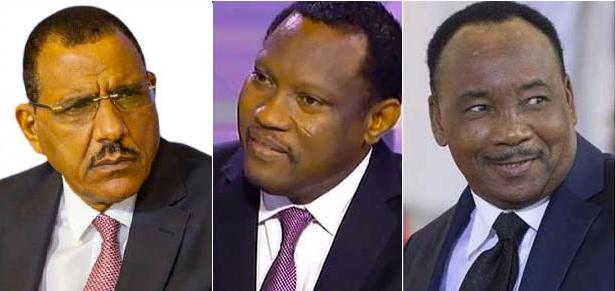
There is an extraordinary parallel between Niger’s current defence ministry corruption scandal and those in Mali which led to the 2012 coup d’état. In Mali the army was quickly put to flight by the Tuareg rebels and Islamists because it was ill equipped and, in key battles, had insufficient ammunition. In the fight for Arguello in Kidal Region around 92 Malian soldiers were massacred — mostly by having their throats slit — after running out of ammunition and being unable to fight. Aguelhok was the worst such debacle for a rag-tag army that had been denied equipment and ammunition because of the corruption of the army’s many generals who, not for the first time in Mali’s history, had plundered the defence ministry funds for their own personal gains. The result was a coup d’état, led by Captain Amadou Sanogo, supported by many other junior officers, ordinary soldiers and much of the population, which resulted in the overthrow of President Amadou Toumani Touré (ATT).
Nigerien army soldiers and their families, along with most of the population, are incensed by these latest revelations. There is widespread talk of an army uprising, which, at least in the current anger of the moment, would probably have the support of much of the country’s civil population, which it is strongly supportive of its armed forces.
Such a coup, which would not be in the least way surprising, is, however, unlikely, partly because of moves by both the legal fraternity and the opposition parties.
There are currently moves afoot by lawyers to bring actions against the defence ministry and government on behalf of the families of many of the soldiers who were killed in recent terrorist attacks on army posts, such as at Inates and Chinégodar. While a group of lawyers, supported by the Commission Nationale des Droits Humains (CNDH), has been set up to look into these cases, it is too early to say whether this action will be successful.
The greatest damage to the government is likely to come from the opposition parties, who are already seeing the defence ministry audit scandal as a golden opportunity to weaken the current ruling party — the Parti Nigérien pour la Démocratie et le Socialisme (PNDS-Tarayya) — and its presidential candidate, Mohamed Bazoum (b.1960), who has already been chosen by the PNDS as Issoufou’s presumed successor. The first round of the next presidential and legislative elections is scheduled to be held on 27 December 2020.
The political opposition, which brings together several platforms, has already published press releases castigating the behaviour of the president and his government. According to our sources, a quintet of opposition leaders is on the front line, and is meeting. It is composed of:
- Ibrahim Yacouba – leader of the MPN Kishin Kassa opposition party and member of the Front patriotique;
- Amadou Djibo Ali (a.k.a. Max) – president of the Front pour la Restauration de la Démocratie et la Défense de la République (FRDDR);
- Omar Hamidou Tchiana – leader of the Alliance des Mouvements pour l’Emergence du Niger (AMEN-AMIN);
- Tahirou Seydou – interim president of Moden Fa Lumana; and
- Mariama Gamatié Bayard – of the Front de l’independent opposition.
Others include Amadou Boubacar Cissé of the Democratic and Republican Front and former President Mahamane Ousmane (1993-1996).
All are united in a strategy to weaken Mohamed Bazoum’s candidacy. Their strategy is to rely on civil society to establish a link between the PNDS — of which Bazoum is the president and the party’s presidential candidate in December 2020 — and the alleged embezzlement. Unsurprisingly Bazoum denies such a link between the PNDS and the embezzlement but two former party ministers and officials — former defence minister Kalla Moutari and the 2011-2016 minister, Mahamadou Karidjo — are amongst the main suspects.
Along with many others, the words of Koroneye Massani, MP from the MPN opposition party, are likely to haunt Bazoum and the PNDS for the remainder of this year. Massani said: ‘It is indeed a pillage: the conscious and methodically organised plundering of the army’s resources at a time when the country is at war. This war, terribly deadly for our people, is just a financial boon for these people.’
The scandal is also likely to have damaging repercussions for both Niger and the G5S on the international front. Hitherto, Niger was regarded internationally as slightly more transparent and less corrupt than its G5S neighbours, notably Chad, Mali and Mauritania under its former dictator, Mohamed Ould Abdel Aziz. Niger will be regarded in the same light as most other members of ‘Françafrique’: France’s endemically corrupt post-colonial network in Africa. It will be surprising if international aid to Niger, especially from the EU will, if not reduced, be placed under more stringent conditionalities.
This excerpt is taken from Sahara Focus, our monthly intelligence report on the Sahara region. Click here to receive a free sample copy.



